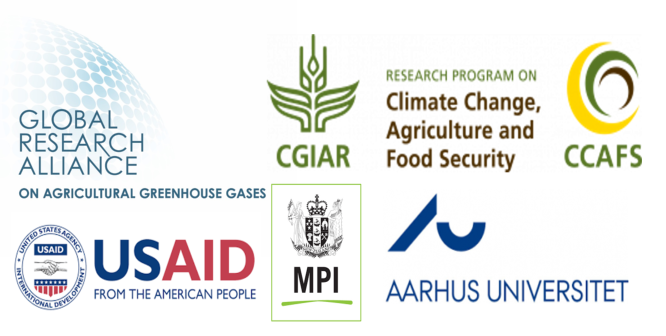CLIFF-GRADS Awardees 2019
The second round of successful candidates of the GRA and CGIAR Research Programme on Climate Change (CCAFS) joint CLIFF-GRADS initiative for 2019 have been announced.
Some 212 applicants from more than 50 developing countries applied to this latest round of the programme, as compared to 65 applicants from 23 countries in the first round earlier this year.
As such, 27 scholarships have been awarded to students from more than 18 countries in this second round.
Scholarship recipients will work in a range of research fields including nutrient management, pasture management, soil and rumen microbiology, tropical agriculture, and greenhouse gas measurement.
The Round 2 awardees are:
Click on the students name below to read more about them
Listed by Name, Nationality, Host Organisation and Project Topic
| Abmiael Ortiz-Chura, Peru INRA – National Institute for Agricultural Research, ARA Centre Effect of modulating interspecies electron transfer exchanges on methane production and rumen microbiota composition. |
| Adnan Zahid, Pakistan USDA -ARS, Soil and Water Conservation Research Unit Using a Tier II Model (CQESTR) to Predict SOC Storage and CO2 Emissions. |
| Bertin Takoutsing, Cameroon ISRIC – World Soil Information Accounting for errors in SOC estimates introduced by proximal sensing methods. |
| Bo-Wen Zhang, China Thünen Institute, Federal Research Institute for Rural Areas, Forestry and Fisheries Modelling pH effects on direct N2O from agricultural soils through complex stable isotope labelling. |
| Camila Almeida dos Santos, Brazil The University of Melbourne Targeting N2O emission hot-spots in intensive dairy pastures for mitigation action. |
| Deysi Ruiz Llontop, Peru National Institute of Agricultural Technology (INTA) Quantification of carbon footprints in livestock production systems under contrasting management of Argentina. |
| Hilaire Sanni Worogo, Benin USDA -ARS, Fort Keogh Livestock & Range Research Laboratory Effects of rangeland management on soil carbon sequestration. |
| Kofi Boateng, Ghana USDA -ARS, Soil and Water Conservation Research Unit Nitrogen fertilizer rate, crop residue amount and soil water content influence on N2O emissions. |
| Lai Lai, Myanmar International Rice Research Institute (IRRI) Compiling a structured Rice Policy Information Portal and demonstrating its potential use in mitigation projects. |
| Lamfu Fabrice Yengong, Cameroon International Livestock Research Institute, Mazingira Centre Manure management interventions to mitigate greenhouse gases. |
| Lucélia de Cássia Rodrigues de Brito, Brazil USDA -ARS, Beltsville Agricultural Research Center, Sustainable Agricultural Systems Laboratory Cover crop and animal manure impacts on soil N2O emissions |
| María Carolina Scorcione Turcato, Argentina National Agricultural Research Institute (INIA) Directed evolution of rumen microbial cultures towards the identification and stimulation of electron sinks alternative to methanogenesis |
| Mariana Eloisa Garcia Ascolani, Paraguay Queens University, UK Predicting appropriate greenhouse gases mitigation strategies based on modelling variables that contribute to ruminant environmental impact |
| Mónica Gabriela Perez, Argentina Bangor University, UK Understanding the controls of N2O in grazed upland and lowland systems |
| Noriel Angeles, Philippines International Rice Research Institute (IRRI) Toward low methane-emitting rice varieties |
| Ntwanano Moirah Malepfane, South Africa Plant & Food Research Comparing deep soil carbon stocks under kiwifruit and pasture land use |
| Paul Soremi, Nigeria International Center for Tropical Agriculture (CIAT), FLAR Turning to rice cultivars for solving the CH4 puzzle in irrigated rice systems |
| Pierre Eke, Cameroon Thünen Institute, Federal Research Institute for Rural Areas, Forestry and Fisheries Soil organic matter sensitivity to land management impact on grasslands and croplands |
| Rangarirayi Lucia Mhindu, Zimbabwe International Livestock Research Institute (ILRI), Mazingira Centre Greenhouse gas emissions from adequately managed rangelands in Kenya |
| Ricardo González Quintero, Colombia Tropical Agricultural Research and Higher Education Center (CATIE) Measuring ammonia emissions and collecting farm data from Costa Rican dairies |
| Samuel Anuga, Ghana International Center for Tropical Agriculture (CIAT), FLAR Just how smart are the climate smart options promoted in the Climate Smart Villages of Nicaragua? |
| Sebastian Bedoya Mazo, Colombia National Institute for Agricultural Research (INRA), ARA Centre Quantifying Hydrogen fluxes and their impact on methane production equations |
| Sikiru Yusuf Alasinrin, Nigeria USDA – ARS, Northern Plains Agricultural Research Laboratory Net greenhouse gas and soil carbon sequestration in response to tillage systems and cropping sequences |
| Thi Thanh Ha Do, Vietnam Center for International Forestry Research (CIFOR) Assessing (agro)forestry landscape restoration options in livestock-degraded regions of montane Kenya and Tanzania |
| Titis Apdini, Indonesia Bangor University, UK Economic implications of GHG mitigation from dairy and beef systems |
| Victor Ilich Alvarado Bolovich, Peru National Institute of Agricultural Technology (INTA) Greenhouse gas mitigation strategies on cow/calf production systems |
| Yuri Gelsleichter, Brazil ISRIC – World Soil Information Assessing the impact of land use change scenarios on soil organic carbon stocks |
About CLIFF-GRADS: CLIFF-GRADS is a joint initiative of the CGIAR Research Program on Climate Change (CCAFS) low emissions development flagship and the Global Research Alliance on Agricultural Greenhouse Gases (GRA). CLIFF-GRADS aims to build the capability of early career agricultural students in developing countries to conduct applied research on climate change mitigation in agriculture, and funding for the programme is provided by the Government of New Zealand and by the CGIAR Trust Fund and bilateral agreements in support of CCAFS.

